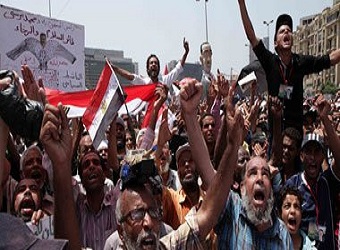Egypt is considering a new constitution that will ban religion-based political parties, reverting to the type of restrictions imposed under Hosni Mubarak and now viewed by authorities as critical for stability after the military’s removal of an Islamist government sparked weeks of violence.
The constitution is taking shape at a rapid clip, as the country’s military-backed interim leaders try to satisfy Western demands and their own promises of a prompt return to civilian rule. But the effort also threatens to leave the country’s basic division unresolved, with supporters of Mohamed Morsi, the ousted president backed by the Muslim Brotherhood, still squared off against Egyptians who felt deeply disappointed by his rule.
A presidentially appointed 10-member panel has completed work on a draft constitution, and state-affiliated media have reported on its key elements in recent days. Along with clamping down on religious political parties, the proposed charter repeals a move by Morsi to strengthen the role of Islamic law in Egypt.
The draft is expected to be sent this week to another presidential panel, consisting of 50 people drawn from a cross-section of society, including the large trade unions, major religious groups, political parties, the security establishment and other constituencies. They are to make final recommendations in 60 days.
A constitutional referendum would follow in the fall — the second such vote in as many years — and set the stage for national elections to choose a new president.
Egypt’s second-largest Islamist organization, the Salafist Nour party, has agreed to join the panel, but the Muslim Brotherhood has not been included. Much of the Brotherhood’s leadership has been imprisoned and is facing criminal charges, including inciting violence — accusationsthat the group describes as politically motivated.
Consensus unlikely
Egypt has struggled for decades to find a formula that balances the role of Islam with the rights of the country’s Christian minority and a strong secular current. As details of the draft constitution emerge, it is far from certain that this round of the process will be any more successful than the others.
Even supporters of the process acknowledge that it is unlikely to produce a national consensus, given the summer’s tumult. But it may, they say, win enough backing for the country to move forward.
“We are in a very sensitive and critical state right now,” said Ahmed Saeed, head of the Free Egyptians Party, one of the groups invited to nominate members to the constitutional advisory panel. “If we really work on women’s rights and children’s rights and press rights, our sector of society — civil Egypt — will be happy. To reach consensus is another matter. . . . I don’t think [the Muslim Brotherhood] will accept it.”
Egypt has about 53 million voting- age citizens. About 26 million participated in last year’s presidential election, which Morsi won. Over the objections of many moderates, he pushed through a new constitution that garnered about 11 million votes in a referendum late last year.
In a stark exchange Tuesday, fugitive Muslim Brotherhood leader Mohamed Beltagy, in hiding for weeks, claimed in a statement aired by Al Jazeera television that the group was acting “for God first,” and he accused the interim leaders of resurrecting Mubarak’s regime. Interim Prime Minister Hazem el-Beblawi said the Brotherhood needed to understand Egypt’s “new reality.”
“Ordinary citizens are afraid of reconciliation with people who were violent and who they think lack good intentions,” he said.
Points of contention
Some points of agreement have emerged, such as elimination of the Shura Council, the upper house of parliament, which added to Mubarak’s and Morsi’s power because the president appointed one-third of its members.
But the flash points have quickly become apparent.
Under Mubarak, political parties of all sorts were tightly controlled by a strict licensing procedure that chafed both religious and secular groups. The procedure was eased substantially after his departure.
But under the draft constitution, Egypt would return to a Mubarak-era provision banning political parties organized “within any religious frame of reference or on any religious basis or on the basis of gender or origin.”
After portions of the draft were published by the state-affiliated al-Ahram news organization, a Brotherhood-affiliated newspaper wrote that the new constitution will “insult Islam and spread immorality.”
The fate of Article 219 also is being closely watched. That provision, enacted with the Muslim Brotherhood’s backing, specified that Egyptian law would be based on Sunni Muslim “jurisprudence” and practice.
The Egyptian constitution has long nodded to Islam in a generic way, but the Morsi-backed provision pointed to a more intense application of Islamic law, known as sharia. The more general language, a compromise that dates to the era of Anwar Sadat, will be retained, while Morsi’s expansion will be repealed, according to the draft.
Although the Nour party has agreed to participate in the constitutional panel, a spokesman for the group last week called aspects of the draft law “a move against the Islamic identity of Egypt.” The party said in a statement that it would participate in the upcoming deliberations to try to defend that identity.
Some secular groups, meanwhile, worry that elements of the proposed constitution could restrict their rights, foiling the demands for reform that forced Mubarak to resign during mass protests in 2011. They argue, for example, that a return to single-member balloting for parliamentary elections favors candidates who can bankroll their campaigns and once helped Mubarak’s cronies dominate elections.
Ahmed Maher, head of one of the groups that galvanized the 2011 revolution, told wire services here last week that the effort to reform the country was “back at square one,” caught in the same standoff between Islamists and the security establishment that for decades was used to justify strict state control of political life.
Source: The Washington Post


